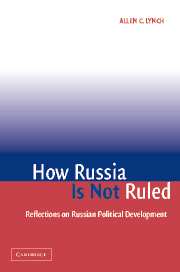Book contents
- Frontmatter
- Contents
- Acknowledgments
- Introduction
- 1 Historical Patterns of Russian Political Development
- 2 Soviet Legacies for Post-Soviet Russia
- 3 The 1990‘s in Russia: A New Time of Troubles?
- 4 Russia's “Neopatrimonial” Political System, 1992–2004
- 5 The Russian 1990s in Comparative Perspective
- 6 What Future for Russia? Liberal Economics and Illiberal Geography
- Conclusions
- Select Bibliography
- Index
5 - The Russian 1990s in Comparative Perspective
Published online by Cambridge University Press: 14 January 2010
- Frontmatter
- Contents
- Acknowledgments
- Introduction
- 1 Historical Patterns of Russian Political Development
- 2 Soviet Legacies for Post-Soviet Russia
- 3 The 1990‘s in Russia: A New Time of Troubles?
- 4 Russia's “Neopatrimonial” Political System, 1992–2004
- 5 The Russian 1990s in Comparative Perspective
- 6 What Future for Russia? Liberal Economics and Illiberal Geography
- Conclusions
- Select Bibliography
- Index
Summary
Spread the truth-the laws of economics are like the laws of engineering. One set of laws works everywhere.
– Lawrence Summers, then chief economist of the World Bank, October 1991.There are no special countries from the point of view of economists. If economics is a science, with its own laws – all countries and all economic stabilization plans are the same.
– Pyotr Aven, Russian Minister of Foreign Economic Relations, February 1992.Russians compensate for the severity of their laws by ignoring them.
– AnonymousIntroduction
To what extent has the Russian exit from communism been unique? After all, Russia is only one of more than two dozen states to have charted an independent path since the disintegration of communist power in Europe between 1989 and 1991. From the perspective of initial starting conditions, then, post-Soviet Russia had much in common with post-Soviet Ukraine, post-Soviet Estonia, and the other republics of the USSR as well as with a number of the formerly communist states of Eastern Europe. Given the apparent similarity of key starting points, a comparison of the post-communist states should shed useful light on whether Russia possesses any distinctive features that may have shaped its postcommunist path of development. Likewise, many social scientists have defined the exit from communism as part of a broader, global process toward democratization that began with the end of authoritarian rule in Spain, Portugal, and Greece in the mid-1970s, so that the Russian “transition” may also be compared to a series of states with noncommunist but authoritarian political legacies.
- Type
- Chapter
- Information
- How Russia Is Not RuledReflections on Russian Political Development, pp. 166 - 194Publisher: Cambridge University PressPrint publication year: 2005

